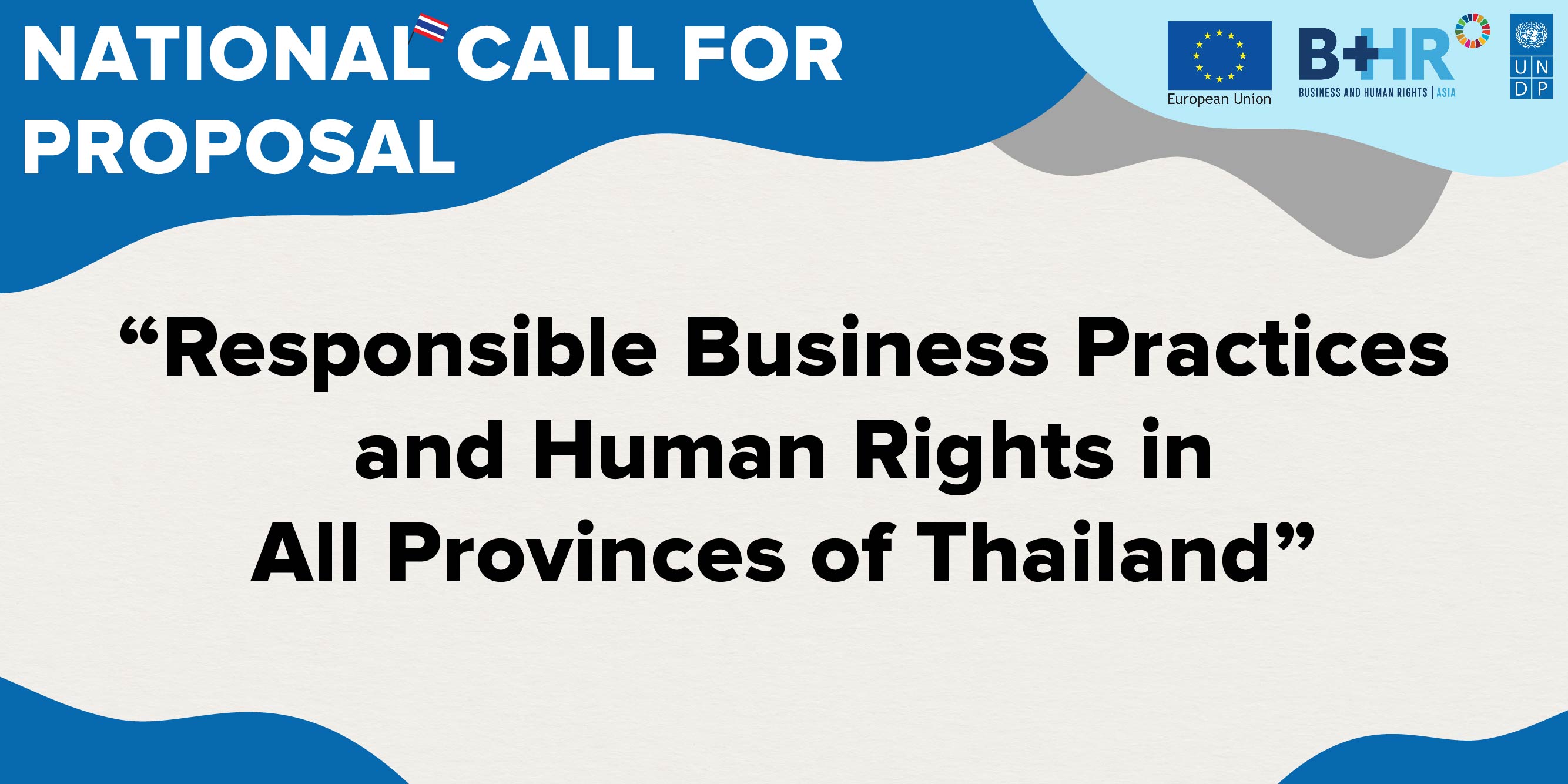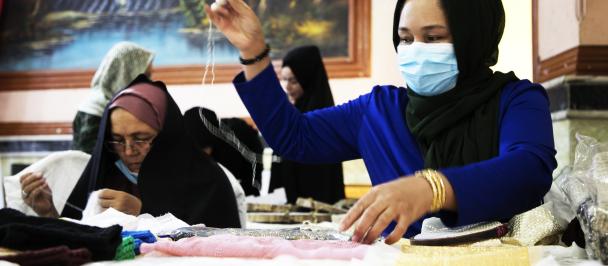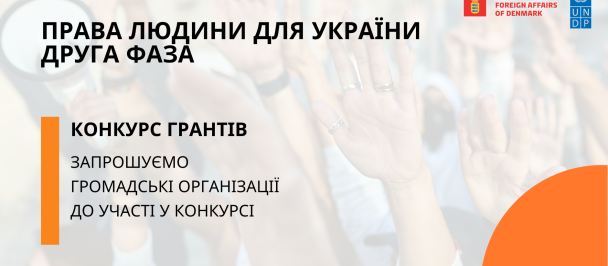Within the framework of Project: “Business and Human Rights”
National Call for Proposal for Grant Submission by NGOs/CSOs in support of Agri-Food Businesses on Responsible Business Conduct and Human Rights in Thailand
June 17, 2022

A. BACKGROUND
UNDP is the United Nations' lead development agency, working to support countries’ work towards achieving the Sustainable Development Goals or SDGs. Through Business and Human Rights in Asia (B+HR) project, UNDP is supporting the Royal Thai Government (RTG) in the implementation of Thailand’s National Action Plan on Business and Human Rights (NAP). UNDP is also enhancing capacity of governmental agencies and businesses, to translate into action their commitment towards the “Protect, Respect, Remedy” framework under the UN Guiding Principles on Business and Human Rights (UNGPs). The B+HR project is implemented with support from the European Union.
In Thailand, the agri-food sector plays a major role in the country’s economy. In 2019, the Thai agri-food sector contributed USD 130 billion to the country’s GDP, representing one quarter of the domestic economy[1]. This activity supported a total of 17.9 million jobs in the country, or 48% of the total employment footprint.
However, the agri-food businesses have been implicated in some human rights issues, including adverse impacts on labour rights, rights related to environment, land rights, and community rights. In recent years, some evidence has emerged suggesting that migrant workers, legal and illegal, that represent over a quarter of total workforce in this sector, have suffered from below-minimum-wage rates, dangerous work conditions, long hours and forced detention. In addition, there are other forms of human rights abuses that commonly found in this sector, such as child labor, forced labor, human trafficking, land-grabbing and displacement of local communities and indigenous people.
The agri-food sector has been further weakened by the impact of COVID-19 pandemic. The rising of business and consumer costs resulted in closure of some businesses, especially small and medium enterprises, and therefore job losses among workers. This has exacerbated the situation of workers in the sector to be more vulnerable to human rights abuses.
Such impact from the outbreak also contributed to supply chain disruptions which subsequently led to higher prices of many basic foods. This impact has been intensified by changing climate causing resource problems such as water scarcity, pollution, and soil degradation and eventually leading to the production risks. The uncertainty of food systems and markets has further worsened the inequality, especially among low-income households, to achieve healthy and safety diets and maintain a food security in their households. Furthermore, malpractice in business operations, for instance, burning crops, excessive use of pesticide, land misuse, water mismanagement and so on, have continued to pose significant risks to the environment and livelihoods and well-being of local communities.
To mitigate both human rights and environmental challenges, businesses need to operate responsibly toward society and environment. This responsibility of businesses has been clearly articulated in the UNGPs. As part of this responsibility, businesses will need to ensure that its own actions, as well as actions of its partners along the value chain, do not adversely impact the any person.
B. PURPOSE OF THE GRANT PROGRAMME
Proposed grant activities should focus on raising awareness of human rights issues, developing mitigating measures (including dialogue between communities and business), and build capacity of agri-food businesses on responsible business practices. The grant is also intended to strengthen the environmental and social responsibility of business operations and supply chains.
To this end, the grant will seek to:
- Identify and minimize environmental and human rights risks in agri-food business operations;
- Which would lead to responsible and healthy sourcing of food by individuals, communities and local buyers; and,
- And have a positive impact on food security and food safety for households.
C. SCOPE OF THE GRANTS PROGRAMME
The proposals shall take an innovative approach aimed at raising awareness and building capacity of agri-food businesses on responsible business conduct and human rights as well as sustaining their market competitiveness.
In addition, applying organizations shall use a human rights-based approach and take into consideration principles of non-discrimination, gender equality and inclusion of marginalized and vulnerable groups when developing proposals.
The grants application shall include, but is not limited to, the following elements:
- Document particular environmental or human rights risks 1) impacting individuals or a community and 2) involving at least one (1) local agri-food business/ network/ association and 3) further develop innovative interventions in response to identified environmental and human rights risks;
- Develop an implementation plan for innovative solutions to prevent and mitigate the identified risks related to environmental and human rights issues; and,
- Produce an outcome report from the intervention to reflect the achievements, challenges and impacts on the selected agri-food business and local communities.
D. ELIGIBILITY CRITERIA
Only local, national or community-based non-governmental and not-for-profit civil society organization that work on sustainability, human rights and community development with at least three (3) years of proven experience, can apply for this grant. Experience working with agri-food businesses, networks and associations will be considered an asset.
Government authorities and for-profit (commercial, private market) actors cannot apply but may participate as cooperation partners in the project or be part of a coalition where a civil society organization is the main applicant.
Applying organizations might consider the development of a CSO coalition/platform. In case of coalition, the main applicant shall have at least three (3) years of proven experience in sustainability, human rights and community development, whereas co-applicants shall have at least one (1) year of proven experience in similar areas.
E. PROCEDURES OF GRANT PROPOSAL SUBMISSION
Those wishing to apply for grant under this call for proposal should submit the following:
- Copy of the Registration of the Organization
- Civil Society Organizational Structure
- Resumes of the proposed project team
- Sample of knowledge products (for example Annual Reports, or applicable Research products)
- Proposed Work Plan (See Annex A);
- Budget Form (See Annex B).
IMPORTANT: Please send Grant Submission Form electronically in one file (pdf format) signed and scanned to the following email: LowValueGrants.th@undp.org Please kindly use the email heading for the submission as “Grant Submission for Business and Human Rights Project”.
The Proposed Work Plan and the Results and Resources Framework (See Annex A) together with Budget Form (See Annex B) shall be submitted as separate documents electronically in Excel format. If additional clarifications required, questions can be sent to the same email address indicated above. Answers to questions will be provided within two working days.
Deadline for applications is 20 July 2022, 23:59 hrs Bangkok, Thailand. Applications received after the deadline will not be considered.
Under the small grants programme, UNDP will contribute approximately 20,000 USD up to two CSOs (USD 10,000 each).
Proposals with the project staff salary costs exceeding 25% of the total budget will be disqualified without further consideration. Co-funding and in-house contributions are strongly encouraged.
Eligible costs include honorarium/salary, workshops and trainings, rental, stationery and office equipment, printing and translation, creation of online tools and resources, and other costs directly related to this assignment.
Expenditures such as the infrastructure improvement, equipment, maintenance, utilities, overhead and similar costs are ineligible for this grant proposal.
F. PROJECT IMPLEMENTATION TIMEFRAME
Implementation period for approved projects shall not exceed ten (10) months, counted from the date of the contract signature to the date when all relevant activities have been successfully completed.
G. SELECTION PROCESS
Decisions on awarding grants are made by a Grant Selection Board (GSB). The Board will be comprised of the representatives of relevant UNDP representatives and other experts engaged for this process.
All GSB decisions on funding projects will be taken no later than three weeks after the closing date for applications. UNDP will inform successful applicants in writing no later than two weeks after the date of the GSB decision.
Applications will be disqualified and will not be further considered, if they:
- Do not comply with priorities or instructions provided in this announcement;
- Contradict to principles of human rights based-approach, non-discrimination and gender equality.
H. SELECTION CRITERIA AND SCORING
The selection criteria will involve the following elements:
|
|
Selection Criteria |
Score |
|
1 |
The project clearly demonstrates how it will support the beneficiaries on raising awareness and building their capacity on responsible business conduct and human rights.
|
Max. 30 points |
|
2 |
The project budget is relevant and feasible within the timeframe. |
Max. 30 points |
|
3 |
The applicant organization(s) has/have relevant experience detailed in the section D. eligibility criteria. |
Max. 20 points |
|
4 |
The project is sustainable and scalable. |
Max. 10 points |
|
5 |
The project uses the principles of human rights-based approach and takes a consideration of the principles of non-discrimination, gender equality and inclusion of marginalized and vulnerable groups |
Max. 10 points |
|
TOTAL |
100 Points |
|
IMPORTANT: You will be notified by email no later than three working days after we have successfully received your application. If you do not hear from us within this timeframe, please, contact us during the next two days and request a confirmation of receipt of email. Otherwise, UNDP will not be responsible for any potential problems in terms of considering the application.
Please click here for more details:

 Locations
Locations

